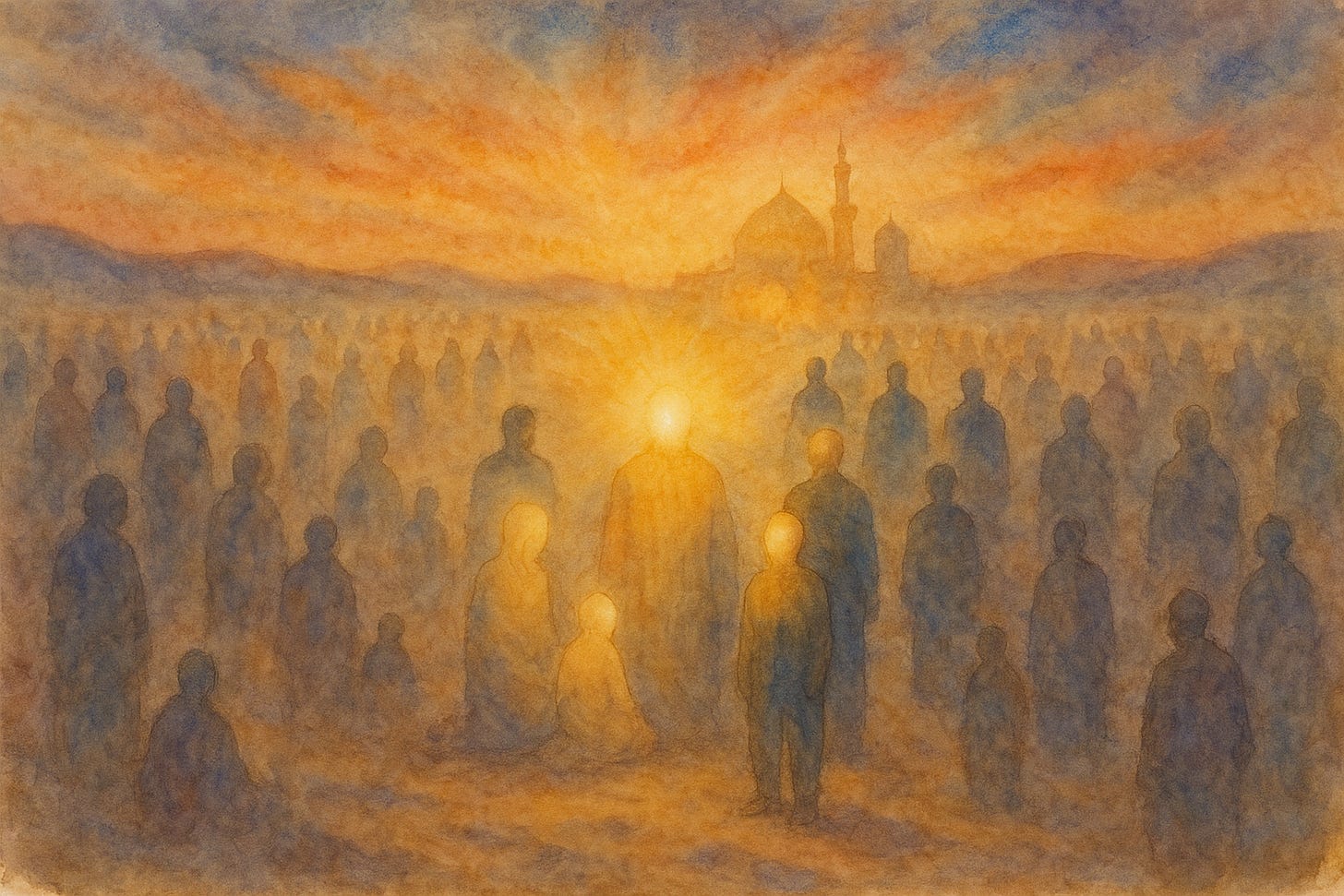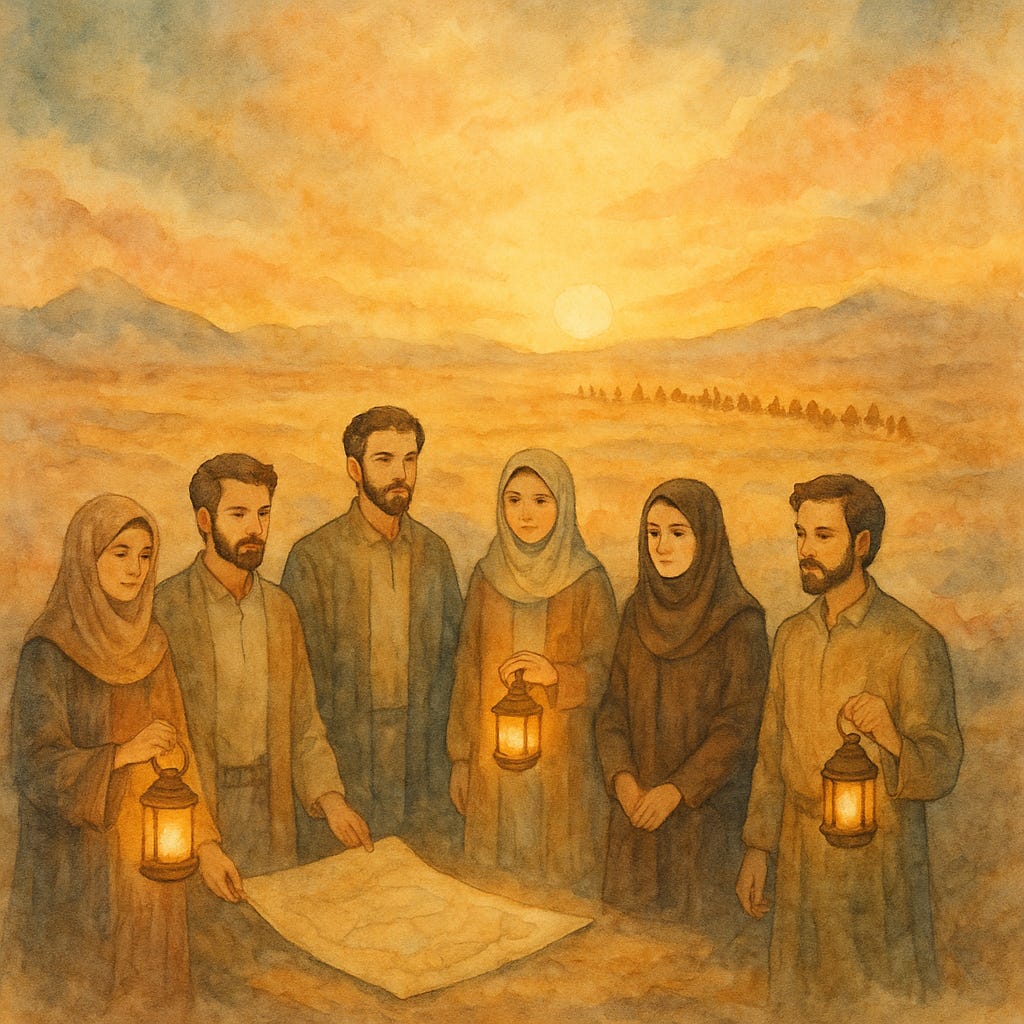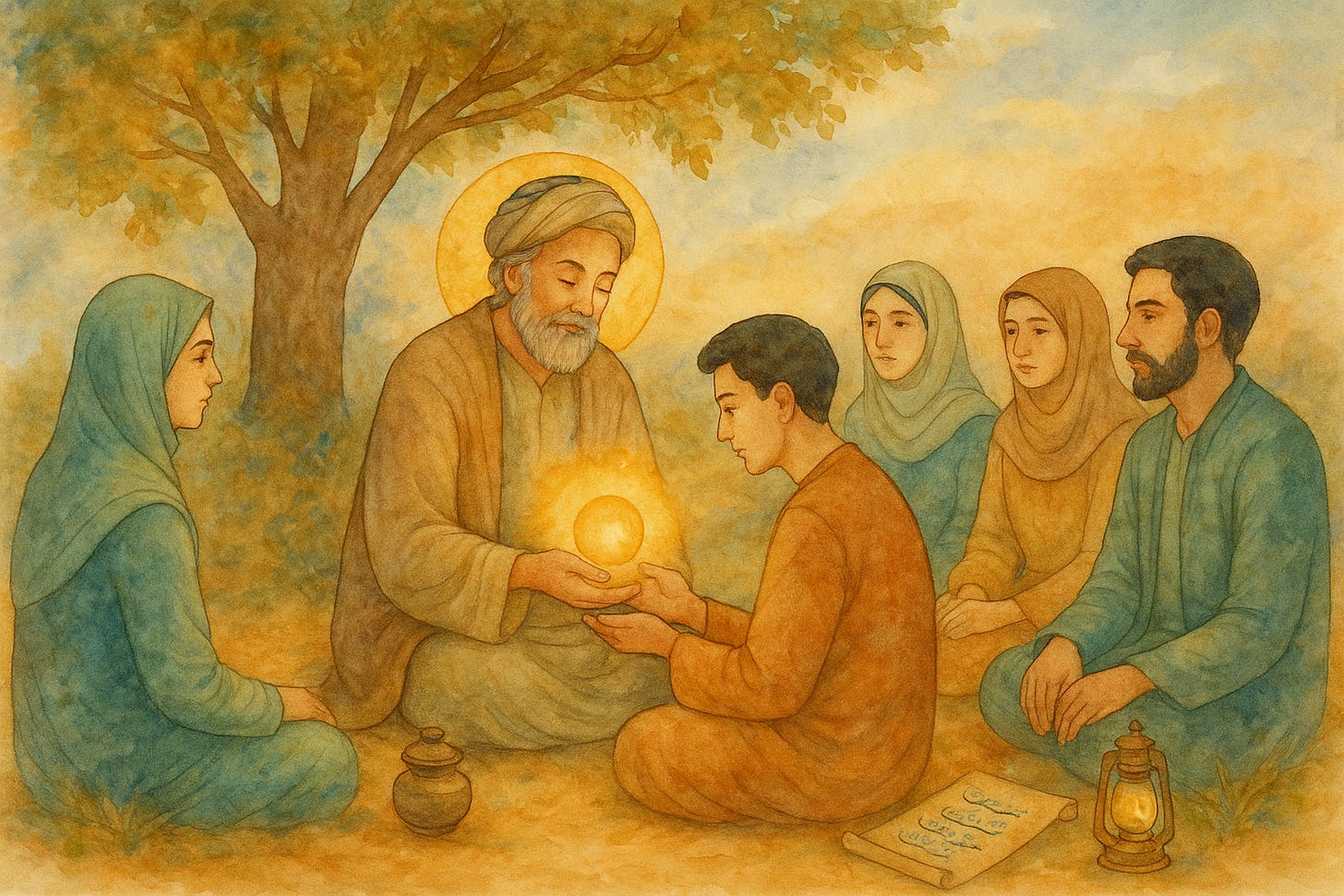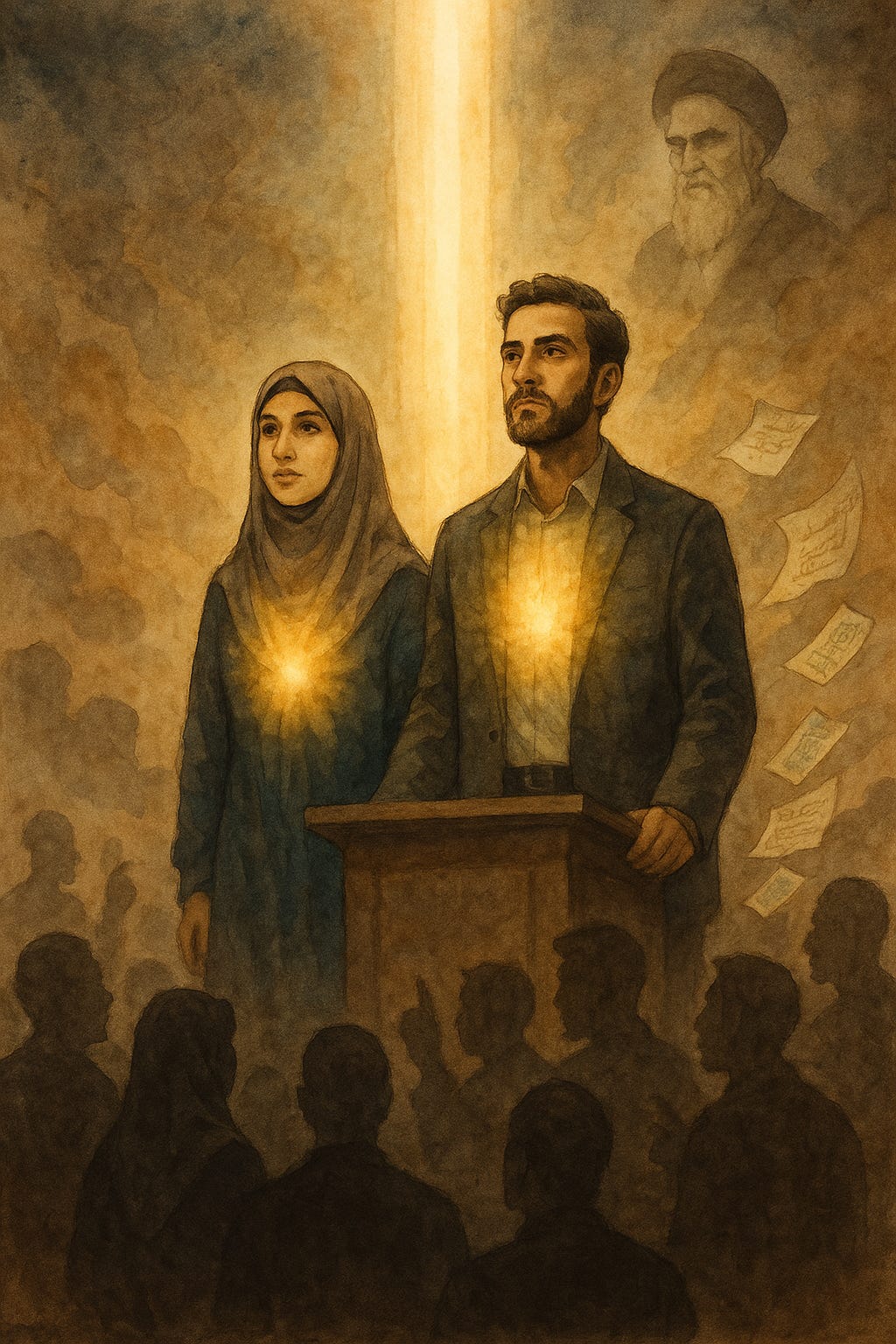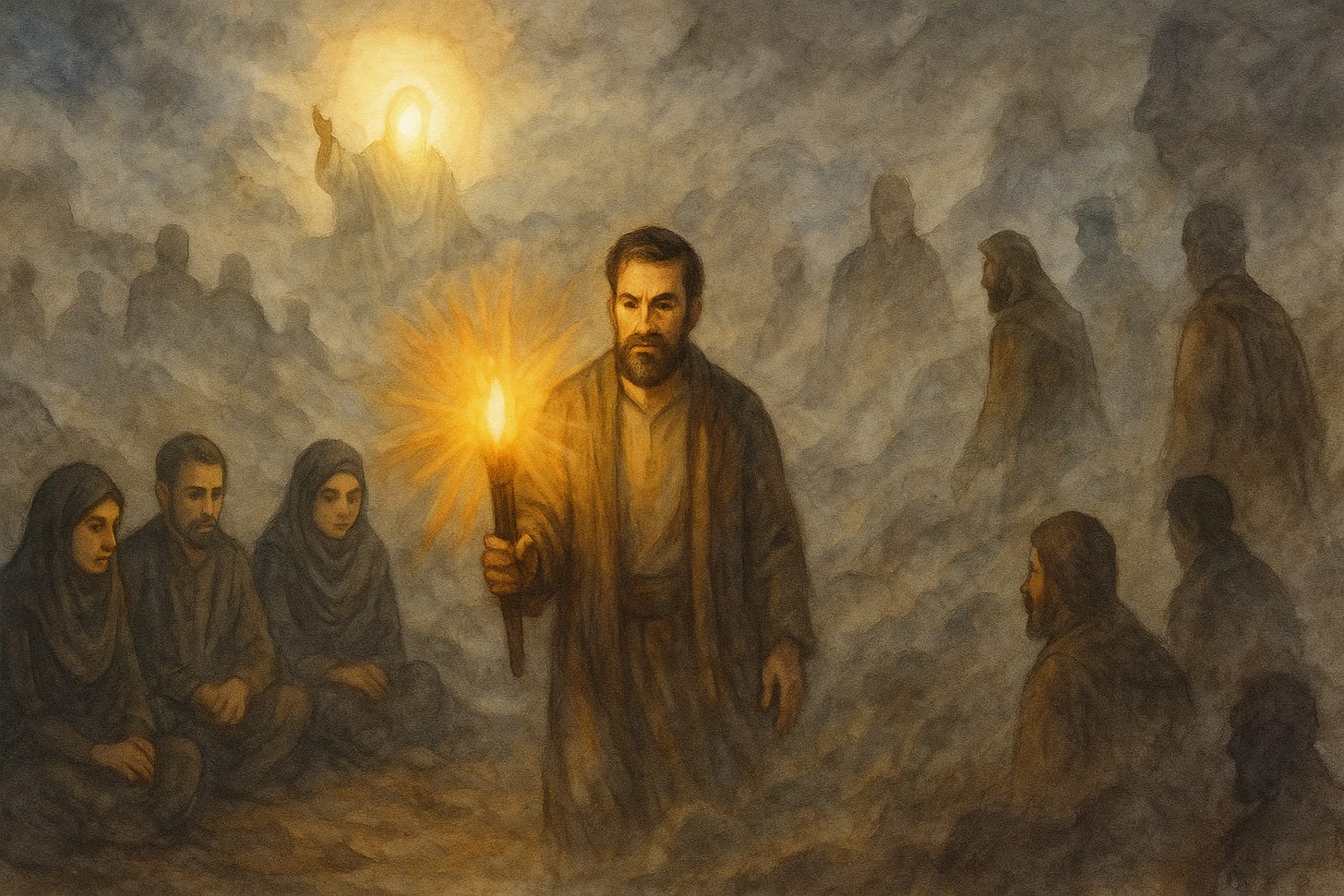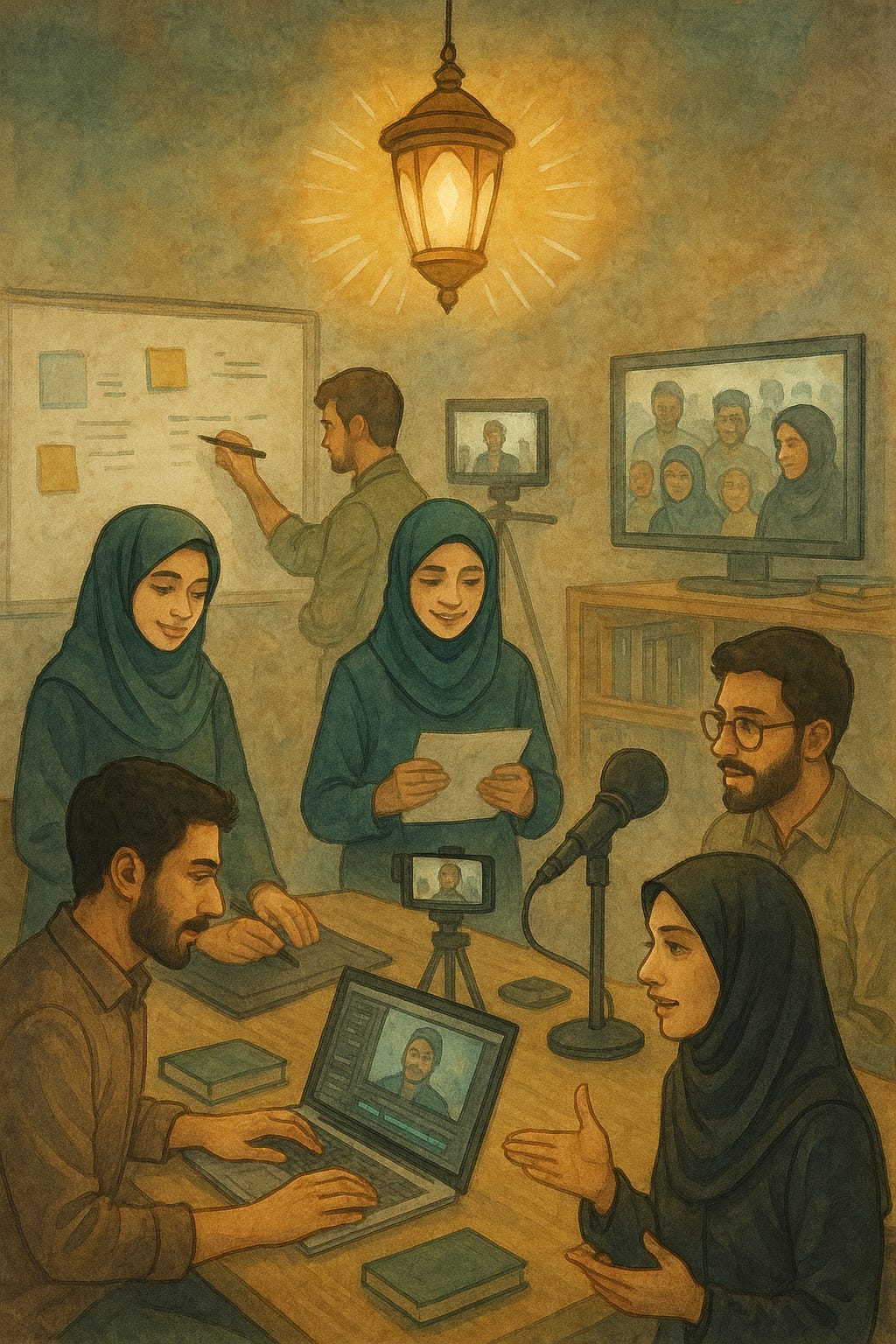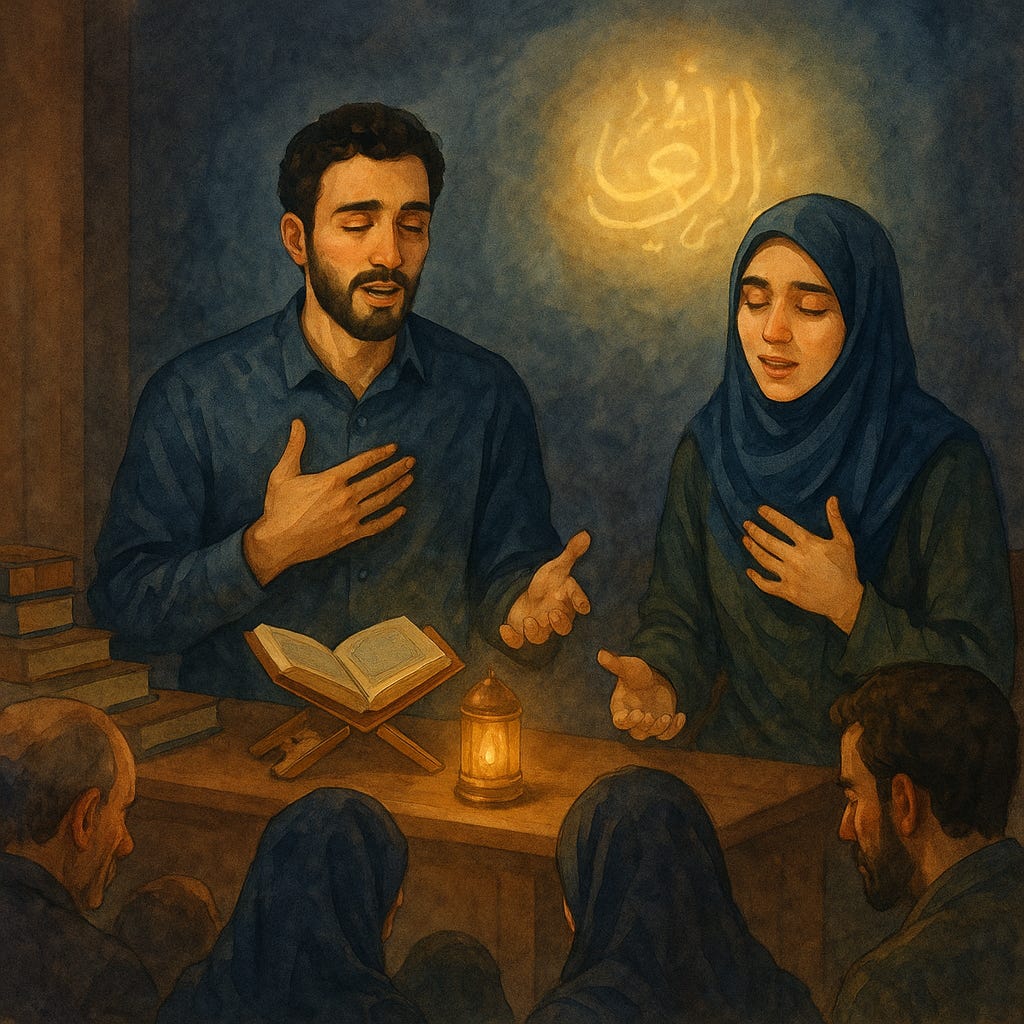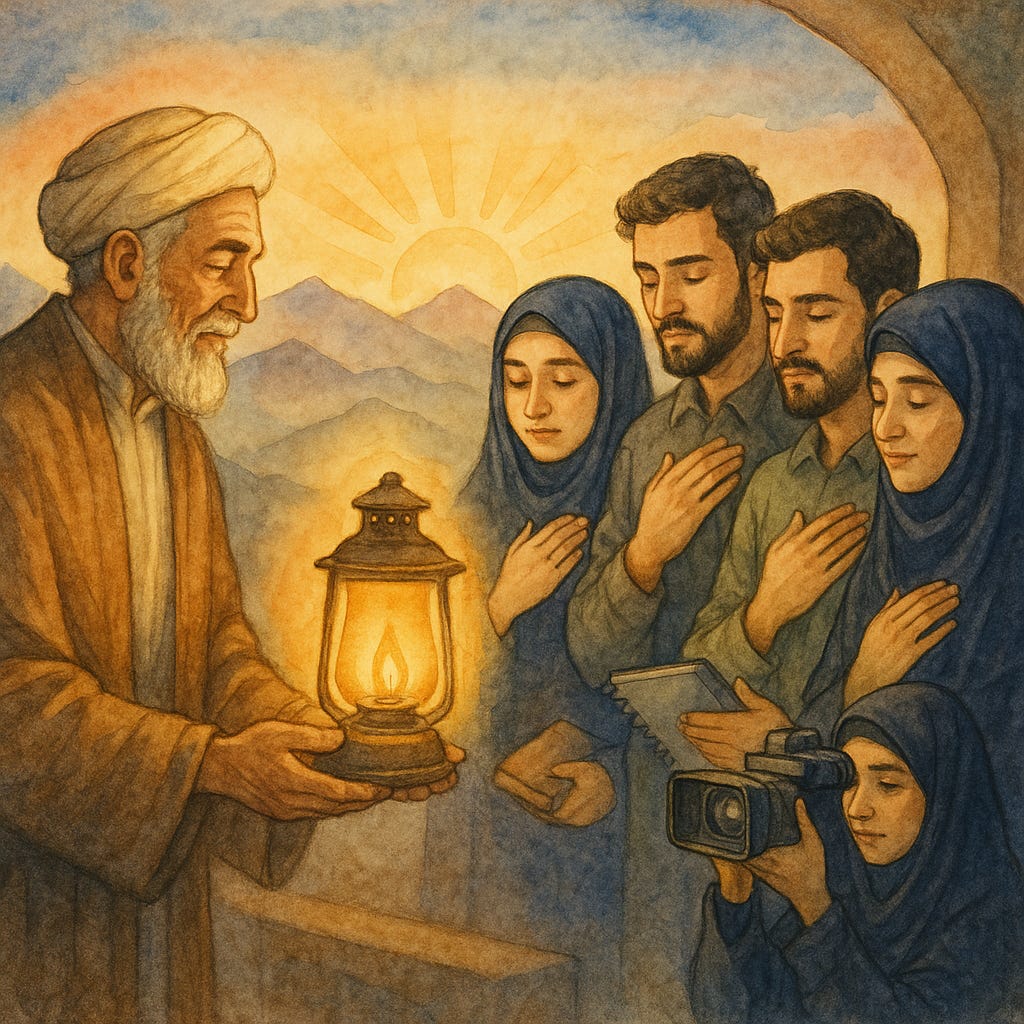[6] Tabyeen (Clarification) - The Requirements of Clarification - Part 3
A series of discussions on the notion of clarification; critical within Islam and Islamic thought. This series is based on lectures delivered by Imam Khamenei. These sessions are for Ashura 2025/1447
In His Name, the Most High
اَلسَّلاَمُ عَلَيْكَ يَا أَبَا عَبْدِاللَّهِ
وَعَلَى الْأَرْوَاحِ الَّتِي حَلَّتْ بِفِنَائِكَ
عَلَيْكُمْ مِنَّا جَمِيعًا سَلاَمُ اللَّهِ أَبَدًا مَا بَقِينَا وَبَقِيَ اللَّيْلُ وَالنَّهَارُ
وَلا جَعَلَهُ اللَّهُ آخِرَ الْعَهْدِ مِنَّا لِزِيَارَتِكُمْ
اَلسَّلاَمُ عَلَى الْحُسَيْنِ
وَعَلَى عَلِيِّ بْنِ الْحُسَيْنِ
وَعَلَى أَوْلَادِ الْحُسَيْنِ
وَعَلَى أَصْحَابِ الْحُسَيْنِPeace be upon you, O Aba Abdillah (O Husayn),
and upon the souls who have gathered in your courtyard.
Upon you, from us all, is the peace of God—forever,
for as long as we remain and as long as night and day endure.
And may God never make this our last pledge to visit you.Peace be upon al-Husayn,
and upon Ali, son of al-Husayn,
and upon the children of al-Husayn,
and upon the companions of al-Husayn.—Adapted from Ziyarat Ashura1
Introduction
This is the sixth in our series of sessions, for the nights of Ashura and Arbaeen, on the subject of Tabyeen (or clarification).
As with our other sessions - such as those on Patience, the Lantern of the Path or on the Art of Supplication - it is strongly recommended that the reader, at the very least review the previous sessions prior to consuming this one.
This is because of the nature of the discussion, and the manner of discourse requires that each part build upon the ones that came before; so as to avoid confusion, misunderstanding and any invalid assumptions; that can lead to what would be the antithesis of tabyeen (clarification).
While we do have a recap for each session (after the first), the recap is highly summarised, and to get the full nuance, the previous sessions will need to be consumed, studied and reflected upon.
The previous sessions can be found here:
Video of the Majlis (Sermon/Lecture)
Audio of the Majlis (Sermon/Lecture)
Recap
Where We Stand
In the previous session, we continued our exploration of the requirements of clarification — uncovering not merely what it means to speak the truth, but how, when, and why it must be spoken.
We examined the illusion of clarification — when the language of truth is hijacked for purposes of distortion, delay, or dissent. We explored the two dangerous ideas infiltrating public consciousness: the false claim that anti-imperialist slogans are rooted in emotion rather than logic, and the even graver deception that compromise with oppressive powers will resolve a nation’s problems. Against these, we reaffirmed the rational, principled, and historical foundations of resistance.
We then turned to the practical dimensions of clarification:
the necessity of combining speech with action
the importance of timeliness, and the consequences of delay
the role of the elites, whose inaction — as seen in Karbala, Kufah, and even Algeria — has cost nations dearly
the need for insight and steadfastness, as exemplified by figures like Ammar
and the formation of discourse as a strategic cultural responsibility — not through slogans alone, but through sustained, sincere repetition infused with understanding
Clarification is not an academic exercise, nor a rhetorical flourish. It is a divine trust, a civilisational task, and a means by which history is either safeguarded or surrendered.
In this next session, we now turn to the final dimension: the soul of clarification. What qualities must reside in the hearts and minds of those who carry this responsibility? How must we speak — and how must we be — for truth to take root in a world clouded by misdirection?
Let us now continue, in the name of the Lord of Husayn, the Lord of the Martyrs, the Lord of those have sacrificed everything to clarify the truth ...
Tabyeen (Clarification) - The Requirements of Clarification - Part 3
A Clarification that Inspires Action
Clarification must not remain in the realm of abstraction or detachment. It must shape movement — movement that is sensible, popular, and above all, disciplined. Clarification that descends into commotion, disorder, or reactive sloganeering bears no fruit. It may stir the air, but it does not transform hearts or redirect societies.
True tabyeen gives rise to action that is strategic, not sporadic — action guided by clear vision, persistent planning, and rooted in the pulse of the people. But for this to happen, there must be a practical strategy. It is not enough to speak lofty truths or express noble dissatisfaction. There must be a path forward, with objectives, responsibilities, and defined roles.
Whose task is this? It is not the exclusive duty of the government, nor is it solely the remit of leadership. Rather, the responsibility to define, guide, and advance this movement falls upon what we may call the circles of the conscious middle — those from among the people, especially the youth and the active intellectuals, who possess both insight and initiative. These are the ones who must analyse the needs of the time, formulate direction, and ensure that the caravan of resistance does not stray from its path.
Praise be to God, such minds are not few. Among our youth, in our universities, cultural centres, and scholarly assemblies, there are those with the brilliance and commitment required for this task. What remains is action. Laziness, disorganisation, and stagnation have no place in the vanguard of truth.
In every age, it has been the prepared — not merely the passionate — who shape the course of history. The duty of tabyeen is not just to clarify the way forward. It is to awaken and organise those who must walk it.
Clarifying with Mannerism and Heart
The message of truth does not reach its destination through words alone — it must pass through the heart of the speaker and enter the heart of the listener. The most powerful clarification is not merely rational; it is rooted in manners, guided by compassion, and carried with spiritual depth.
Two dimensions must be cultivated in those who undertake this duty: the mind and the heart.
The intellectual foundations of the youth must be strengthened so they are not swayed by superficial arguments, hollow modernism, or hostile currents. They must be empowered to stand firm and also transform their environments, becoming beacons of light and understanding in their communities.
But intellect alone is not enough. Without the softening of the heart, knowledge can become pride, and clarity can become harshness. A person grounded in reason but lacking in humility and remembrance may fail to inspire, or worse — may repel.
The heart must be trained in obedience, repentance, dhikr, and reliance upon God. These spiritual states support the intellect, sustain sincerity, and protect from arrogance or despair. If they are absent, the tongue may continue to speak the truth, but the soul will falter.
This is why mannerism — good etiquette, humility, honesty in speech, sincerity in position, and wisdom in correction — is not secondary to tabyeen. It is essential to it. The Quranic command to “invite to the path of your Lord with wisdom and goodly exhortation” speaks directly to this balance between clarity and compassion.
Speech must be tailored to the audience. The language of scholars is not the language of students; the vocabulary of the hawza is not the same as that of the university. The failure to account for this — to meet people where they are — closes the door to understanding.
كونوا دعاة للناس بغير ألسنتكم، ليروا منكم الورع والاجتهاد والصلاة والخير، فإن ذلك داعية
Be callers (inviters) to the people without your tongues, so that they may see from you piety, effort, prayer, and goodness, for that is a true invitation.
— Al-Kulayni2, Al-Kafi3, Volume 2, Page 78
— Al-Majlisi4, Bihar al-Anwar5, Volume 67, Page 303
— Reyshahri6, Mizan al-Hikmah7, Volume 4, Page 3602
Just as the Prophet (peace and blessings be upon him and his family) was likened by Imam Ali (peace be upon him) to a “roaming physician with prepared ointments and heated instruments”:
طَبِيبٌ دَوَّارٌ بِطِبِّهِ، قَدْ أَحْكَمَ مَرَاهِمَهُ، وَأَحْمَى مَوَاسِمَهُ، يَضَعُ ذَلِكَ حَيْثُ الْحَاجَةُ إِلَيْهِ، مِنْ قُلُوبٍ عُمْيٍ، وَآذَانٍ صُمٍّ، وَأَلْسِنَةٍ بُكْمٍ، مُتَتَبِّعٌ بِدَوَائِهِ مَوَاضِعَ الْغَفْلَةِ، وَمَواطِنَ الْحَيْرَةِ
“The Prophet was like a roaming physician who has set ready his ointments and heated his instruments. He uses them wherever the need arises for curing blind hearts, deaf ears, and dumb tongues. He followed with his medicines the spots of negligence and places of perplexity.”
— Nahjul Balagha8, Sermon #108
—so too must the scholars and speakers of today move among the people — diagnosing spiritual ailments, applying the right treatment, and speaking with the tenderness of one who wishes for their cure.
A harsh tongue and distant heart may win arguments, but they do not build movements. Clarification that is sincere is always accompanied by beautiful character.
Engaging the Online Space with Wisdom
In our age, the online space has become one of the most contested and influential arenas of thought, identity, and culture. While the enemies of truth exploit it to spread despair, distortion, and doubt, the youth of faith must rise to reclaim it — not with agitation or recklessness, but with hope, clarity, and responsible presence.
This space must be utilised to:
cultivate insight,
strengthen steadfastness,
oppose laziness and apathy,
and amplify messages of sincerity and truth.
What is posted, shared, or written should not merely follow trends or provoke emotion. It must build. Build understanding. Build resilience. Build confidence in divine values.
The digital realm should not be a place where believers react blindly or mirror the toxic habits of ideological adversaries. It should be a platform of responsibility, where the voice of the divine cause is presented with dignity, intelligence, and strategy.
A single well-crafted post can awaken a soul. A short but sincere video can redirect a generation. A consistent online presence — clean, truthful, compassionate — can form part of the broader jihad of clarification in our time.
But this requires that we engage not just as individuals venting emotions, but as representatives of a mission. When the believer logs on, they do so with the consciousness of one stepping onto a battlefield — where the war is for hearts, minds, and ultimately, destinies.
Courage in Understanding and Speech
Clarification requires courage — not only the courage to act, but the courage to understand, speak, and stand firm when truth becomes unpopular.
Courage is not limited to the battlefield. It is equally essential in the realm of thought, scholarship, and cultural leadership. Deep understanding demands bravery. At times, fear of criticism, social backlash, or the threat of losing position paralyses a person’s judgement. They begin to question not what is false, but whether they dare say what is true.
This is a spiritual disease. It silences the voice of revelation under the pressure of public opinion.
Some are afraid that if they speak clearly, they will be labelled. Others fear that their words may cause controversy. But the Quran commands:
ٱلَّذِينَ يُبَلِّغُونَ رِسَـٰلَـٰتِ ٱللَّهِ وَيَخْشَوْنَهُۥ وَلَا يَخْشَوْنَ أَحَدًا إِلَّا ٱللَّهَ ۗ وَكَفَىٰ بِٱللَّهِ حَسِيبًا
“Those who deliver the messages of God and fear Him, and do not fear anyone but God. And God is sufficient as reckoner.”
— Quran, Surah al-Ahzaab (the Chapter of the Confederates) #33, Verse #39
The fear of public reaction must be replaced with taqwa — reverence for God. The more one fears people, the less clarity they will possess. But the one who fears God alone is gifted with discernment (furqan), the ability to distinguish right from wrong:
يَـٰٓأَيُّهَا ٱلَّذِينَ ءَامَنُوٓا۟ إِن تَتَّقُوا۟ ٱللَّهَ يَجْعَل لَّكُمْ فُرْقَانًا
“O you who have faith! If you are wary of God, He shall appoint a criterion for you.”
— Quran, Surah al-Anfaal (the Chapter of the Spoils of War) #8, Verse #29
Even the Prophet Muhammad (peace and blessings be upon him and his family) was reminded in the Quran to give precedence to God’s will over fear of reproach:
وَتَخْشَى ٱلنَّاسَ وَٱللَّهُ أَحَقُّ أَن تَخْشَىٰهُ
“You feared the people, though God is worthier that you should fear Him.”
— Quran, Surah al-Ahzaab (the Chapter of the Confederates) #33, Verse #37
This was a trait visible in the life of Imam Khomeini — a courage that blended spiritual conviction with clarity of stance. He feared no tyrant, and sought no praise. His words disturbed the comfortable and awakened the confused — because he spoke without compromise.
It is through such courage that hearts are moved and truth is defended. This courage must not only be exercised in battle or politics — but in classrooms, pulpits, online posts, and cultural conversations. Wherever falsehood seeks to dominate, the courageous must speak.
As the Quran says:
“ٱلَّذِينَ قَالَ لَهُمُ ٱلنَّاسُ إِنَّ ٱلنَّاسَ قَدْ جَمَعُوا۟ لَكُمْ فَٱخْشَوْهُمْ فَزَادَهُمْ إِيمَـٰنًۭا وَقَالُوا۟ حَسْبُنَا ٱللَّهُ وَنِعْمَ ٱلْوَكِيلُ”
“Those to whom the people said, ‘The people have gathered against you, so fear them.’ But it increased them in faith, and they said, ‘God is sufficient for us, and He is the best disposer of affairs.’”
— Quran, Surah Aal-i-Imraan (the Chapter of the Family of Imraan) #3, Verse #173
Wisdom in Times of Sedition
In times of sedition, the path of clarification becomes more difficult — and more essential. Confusion abounds. Truth and falsehood intertwine. Emotions flare. People hesitate. And even well-meaning individuals may misinterpret religious guidance.
One such example is the oft-quoted narration of Imam Ali (peace be upon him), who said:
كُنْ فِي الْفِتْنَةِ كَابْنِ اللَّبُونِ لَا ظَهْرٌ فَيُرْكَبَ، وَلَا ضَرْعٌ فَيُحْلَبَ
“During sedition, be like a young camel — neither fit to be ridden nor to be milked.”
— Nahjul Balagha9, Saying #1
Some have wrongly understood this to mean disengagement — that one should remain silent, neutral, or aloof. But this is not what the Commander of the Faithful intended. The narration instructs that the seditionist should find no utility in you — neither by riding your back, nor by exploiting your silence. It is not a call to withdrawal; it is a warning not to become a tool.
When sedition breaks out — as it did during the Battle of Siffin — the responsibility of the sincere is to speak, clarify, and guide. We find Ammar ibn Yasir (may God bless his pure soul), moving tirelessly between camps, explaining, persuading, and illuminating the reality of the conflict. He did not retire into silence. He carried the torch of insight while others were paralysed by uncertainty.
Contrast this with the likes of Abdullah ibn Masoud, who came to Imam Ali (peace be upon him) during that same war and said, “O Commander of the Faithful, we have doubts about this battle. Send us elsewhere.” These were men who recognised his legitimacy — but failed to support him when it mattered most.
Such hesitation strengthens the hand of falsehood.
Even today, there are those who hear sincere clarification and say, “Why did he speak now? Could he not have waited?” But truth deferred is often truth denied. Clarification is not seasonal. It is a trust. And the one who carries it must speak — especially when silence deepens confusion.
This was the path of Imam Khomeini — who spoke openly, without favour or fear, whenever distortion or deviation appeared. His responsibility, like that of all those entrusted with the guardianship of truth, was not to appease sensitivities, but to preserve principles.
Even those who may be sincere in faith can fall into error by placing personal preference, political discomfort, or social niceties above the duty to clarify. Clarification must not be weaponised to provoke conflict — but it must also never be abandoned in the face of it.
Avoiding Commotion and Creating Solutions
Clarification is a noble duty — but it must be carried out with wisdom, dignity, and purpose. It must not descend into commotion, personal attacks, or disruption for its own sake.
There are times when sincere, energetic youth attend a gathering or protest a speaker, not because of malice, but because they see a deviation or betrayal of principle. However, when this response turns into disorder, shouting, or sabotage, it no longer serves the cause of clarification — it serves confusion.
Clarification must be foundational to our work. But it must be expressed in a manner that builds — not breaks. That refines — not ridicules. That opens hearts — not hardens them.
The goal of clarification is to increase awareness, not division; to identify problems while offering pathways to their resolution. The most effective clarification is often that which prompts gratitude from those in positions of responsibility — even when it includes criticism. When expressed with sincerity and insight, even difficult truths can assist those in governance by exposing blind spots, sharpening understanding, and guiding action.
Indeed, many officials — when corrected with respect and fairness — have openly acknowledged that such interventions made their duties easier and more focused.
This is the mark of true clarification: it brings clarity without cruelty, firmness without arrogance, and reform without personal gain.
It is not the place for hesitation. It is not the time for protecting personal interests. The question must always be: Is this the truth? Is this our duty? Will this please God?
Because on that Day — when all veils are lifted — we will not be asked whether we avoided criticism or maintained popularity. We will be asked whether we clarified, sincerely and courageously, what needed to be clarified.
Innovation and the Need for New Methods
Clarification is not a repetition of the past — it is the renewal of truth in every age. And for that, we must innovate.
New circumstances demand new methods. The challenges of our era — from the speed of misinformation to the dominance of superficial media — cannot be countered with outdated strategies alone. The youth of this ummah must not wait for perfect resources or ideal conditions. They must act — creatively, responsibly, and with initiative.
Waiting for others to create tools, launch campaigns, or prepare content is not befitting of those who carry a divine responsibility. Everyone has a role. Every home, every school, every platform is a potential centre of tabyeen — if animated by sincerity and strategy.
The digital age demands new styles of expression, dynamic formats, and adaptable voices. Not all audiences respond to long lectures or traditional sermons. Some are moved by short films, others by poetry, documentaries, animated explainers, interviews, or honest street conversations.
Those who carry the message must be alert to these shifts — and equip themselves accordingly.
What matters is not the method, but the message. And what ensures its acceptance is not merely the content, but the truthfulness of the one delivering it.
In this age, where spiritual and ideological warfare has entered every screen and scroll, believers must bring creativity into the service of conviction. Clarification must be imaginative, attractive, and unafraid to experiment — so long as it remains tethered to divine principles and avoids dilution.
For the enemy innovates constantly — in style, message, and approach. If the believers remain static, even their truths may be drowned out by the sheer noise of falsehood.
Mastery of Speech and Embracing Emotion
Some people speak well — their words are fluent, their vocabulary rich. Yet their speech has no weight, no impact, no soul. Why? Because clarification is not about sounding good — it is about conveying the truth with conviction, sincerity, and mastery of purpose.
Mastery of speech in tabyeen is not simply a matter of linguistic flair. It is the alignment of:
heart and tongue,
intellect and emotion,
and content and context.
Words are vessels. If they are not filled with sincerity, they are empty no matter how eloquent. If they are not rooted in knowledge, they are dangerous no matter how moving. But when sincere knowledge is conveyed with carefully chosen words, appropriate tone, and strategic delivery, they can transform a heart, revive a community, or awaken a dormant soul.
Furthermore, emotion is not the enemy of truth. In fact, when properly integrated, it is one of its greatest allies. To speak only with facts is to risk sterility; to speak only with emotion is to risk chaos. But to speak with feeling, anchored in revelation, and refined by wisdom — that is the art of prophetic communication.
The Quran does not shy away from emotion. It presents the cries of prophets, the grief of martyrs, the trembling of the faithful. It stirs not just the mind, but the ribs and the soul.
In our age — when many are numb to truth and distracted by spectacle — it is often the combination of deep insight and heartfelt expression that cuts through.
As the Quran says:
وَقُولُوا۟ لِلنَّاسِ حُسْنًۭا
And speak kindly to the people.
— Quran, Surah al-Baqarah (the Chapter of the Cow) #2, Verse #83
The speaker must care — not merely to win an argument, but to heal a heart. The clarifier must weep for the one they are trying to guide. They must be like the Prophet Muhammad (peace and blessings be upon him and his family), whom God described as:
لَقَدْ جَآءَكُمْ رَسُولٌۭ مِّنْ أَنفُسِكُمْ عَزِيزٌ عَلَيْهِ مَا عَنِتُّمْ حَرِيصٌ عَلَيْكُم بِٱلْمُؤْمِنِينَ رَءُوفٌۭ رَّحِيمٌۭ
Certainly a Messenger has come to you from among yourselves; grievous to him is your distress; he is full of concern for you; to the faithful he is most kind and merciful.
— Quran, Surah at-Tawbah (the Chapter of Repentance) #9, Verse #128
This is the model of tabyeen we seek:
Not cold precision. Not vain verbosity.
But speech that is alive — with mercy, meaning, and mission.
Conclusion
The Art and Ethics of Clarification
Clarification is not merely the repetition of truths — it is the wise, courageous, and sincere unveiling of reality in every age, adapted to every circumstance. In this part, we have explored the moral and intellectual qualities that make tabyeen effective:
the courage to speak amidst confusion,
the discernment to act with wisdom in times of sedition,
the discipline to avoid agitation and promote constructive reform,
the creativity to innovate new methods,
and the eloquence to blend knowledge with emotional sincerity.
These are not optional virtues — they are essential foundations. Without them, even the best message may be drowned out. But when tabyeen is carried by hearts that fear none but God, and voiced through words born of conviction, it becomes a civilisational force — one that protects faith, heals societies, and invites the world to truth with beauty and strength.
Looking Ahead: Clarification in Action
In the next session, we will explore the practical modalities and methods through which this divine responsibility can be carried out. From the importance of understanding one’s audience, to indirect modes of conveying truth, to the formation of intellectual gatherings, knowledge-based circles, and effective use of media and online platforms — we will examine how tabyeen can move from the heart and mind to society at large.
Truth, after all, does not speak itself — it needs messengers. And messengers must be both skilled and sincere.
Supplication-Eulogy: #6: “Sweeter Than Honey”
Sixth Night - “Sweeter Than Honey”
In His Name, the Lord of the Martyrs and the Truthful
O God, Send your blessings upon Muhammad and the Family of Muhammad
O God…
Who plants courage in the hearts of children?
Who gives a boy the fire to stand before a thousand swords,
not with arrogance,
but with love?Tonight, we remember Qāsim —
a rose in bloom,
son of Hasan,
nephew of Husayn,
the child whose footsteps echoed forever on the plains of Karbala.O my Lord…
What did this boy know of war?
What did his hands know of swords?
And yet when Husayn said,
“You are the remembrance of my brother — stay back,”
his face changed.
He trembled — not in fear —
but in longing.He asked, “Am I not among those who will be slain?”
And Husayn…
Husayn wept and said:“How do I permit you, O child of my brother?”
O God…
He pressed again.
He begged.
And finally, the Imam gave him permission.
But not without a farewell.
Not without tears falling upon the cheeks of youth.
Not without wrapping the boy in his own cloak.
Not without tying his turban.And Qāsim rode.
His face shining like a moon.
His voice like the call of a heavenly bird.He fought bravely —
but they surrounded him.
They trampled him.
They shattered him.
And as he cried out,
“O uncle! Come to me!”
Imam Husayn rushed like fire through the field —
but too late…Too late to stop the hoofs.
Too late to save the crushed chest.O my Lord…
How does an uncle gather the broken body of a boy?
How does one carry that bundle back to the tents?
What did Husayn say to the sister of Hasan
as he laid her son before her?What mother’s heart can bear such a night?
O Hidden One… O son of Hasan…
When you rise to avenge the blood of Karbala,
will you remember the crushed bones of your cousin Qāsim?
Will you call upon us
with the same fire he carried?Give us the heart of Qāsim.
Let us find sweetness in sacrifice.
Let us answer without hesitation
when You call.O God, make me of those who find death sweet in Your path,
as Qāsim ibn al-Hasan found it sweet.And grant me the purity of childhood,
the struggle of the righteous,
and the gaze of the contented Master.Tonight, we weep for a boy who rode toward eternity.
Who answered not a call for war,
but a call of love.Tonight we say: Death is sweet —
if it is for truth.
If it is for Husayn.
If it is with a smile, like Qasim.
And from Him alone is all ability and He has authority over all things.
Adapted from Ziyarat Ashura. The original from Ziyarat Ashura is in the singular form, I have taken the liberty of pluralising it:
The original Arabic and English translation is as follows:
اَلسَّلاَمُ عَلَيْكَ يَا أَبَا عَبْدِاللَّهِ
وَعَلَى الْأَرْوَاحِ الَّتِي حَلَّتْ بِفِنَائِكَ
عَلَيْكُمْ مِنِّي جَمِيعًا سَلاَمُ اللَّهِ أَبَدًا مَا بَقِيتُ وَبَقِيَ اللَّيْلُ وَالنَّهَارُ
وَلا جَعَلَهُ اللَّهُ آخِرَ الْعَهْدِ مِنِّي لِزِيَارَتِكُمْ
اَلسَّلاَمُ عَلَى الْحُسَيْنِ
وَعَلَى عَلِيِّ بْنِ الْحُسَيْنِ
وَعَلَى أَوْلَادِ الْحُسَيْنِ
وَعَلَى أَصْحَابِ الْحُسَيْنِPeace be upon you, O Aba Abdillah (O Husayn),
and upon the souls who have gathered in your courtyard.
Upon you, from me, is the peace of God—forever,
for as long as I remain and as long as night and day endure.
And may God never make this my last pledge to visit you.Peace be upon al-Husayn,
and upon Ali, son of al-Husayn,
and upon the children of al-Husayn,
and upon the companions of al-Husayn.
I have made the following changes to the Arabic so as to pluralise:
مِنِّي (minnī - from me) changed to مِنَّا (minnā - from us)
بَقِيتُ (baqītu - I remain) changed to بَقِينَا (baqīnā - we remain)
الْعَهْدِ مِنِّي (al-'ahdi minnī - my pledge) changed to الْعَهْدِ مِنَّا (al-'ahdi minnā - our pledge)
Shaykh al-Kulayni (c. 864–941 CE / 250–329 AH), whose full name is Abu Jaʿfar Muhammad ibn Yaqub al-Kulayni al-Razi, was a leading Shia scholar and the compiler of al-Kafi, the most important and comprehensive hadeeth collection in Shia Islam.
Born near Rey in Iran around 864 CE (250 AH), he lived during the Minor Occultation of the twelfth Imam (874–941 CE / 260–329 AH) and is believed to have had contact with the Imam’s deputies.
Shaykh Al-Kulayni traveled extensively to collect authentic narrations, eventually settling in Baghdad, a major center of Islamic scholarship.
His work, al-Kafi, contains over 16,000 traditions and is divided into sections on theology, law, and miscellaneous topics, forming one of the "Four Books" central to Shia hadeeth literature.
Renowned for his meticulous scholarship and piety, Shaykh al-Kulayni’s legacy remains foundational in Shia studies, and he is buried in Baghdad, where he died in 941 CE (329 AH).
Al-Kafi is a prominent Shia hadeeth collection compiled by Shaykh al-Kulayni (see Note 1) in the first half of the 10th century CE (early 4th century AH, approximately 300–329 AH / 912–941 CE). It is divided into three sections:
Usul al-Kafi (theology, ethics),
Furu' al-Kafi (legal issues), and
Rawdat al-Kafi (miscellaneous traditions)
Containing between 15,000 and 16,199 narrations and is considered one of the most important of the Four Books of Shia Islam
Allamah Muhammad Baqir al-Majlisi (1037 AH / 1627 CE - 1110 or 1111 AH / 1698 or 1699 CE), a highly influential Shia scholar of the Safavid era, is best known for compiling Bihar al-Anwar, a monumental encyclopedia of Shia hadeeth, history, and theology that remains a crucial resource for Shia scholarship; he served as Shaykh al-Islam, promoting Shia Islam and translating Arabic texts into Persian, thereby strengthening Shia identity, though his views and actions, particularly regarding Sufism, have been subject to debate.
Bihar al-Anwar (Seas of Light) is a comprehensive collection of hadeeths (sayings and traditions of Prophet Muhammad and the Imams) compiled by the prominent Shia scholar Allamah Muhammad Baqir al-Majlisi.
This extensive work covers a wide range of topics, including theology, ethics, jurisprudence, history, and Quranic exegesis, aiming to provide a complete reference for Shia Muslims.
Allamah Majlisi began compiling the Bihar al-Anwar in 1070 AH (1659-1660 CE) and completed it in 1106 AH (1694-1695 CE), drawing from numerous sources and serving as a significant contribution to Shia Islamic scholarship.
Muhammad Reyshahri (1946–2022 CE / 1365–1443 AH) was a distinguished Shia scholar and jurist, best known as the compiler of Mizan al-Hikmah (The Scale of Wisdom). His scholarly endeavours focused on hadeeth studies, ethics, and Islamic jurisprudence, with Mizan al-Hikmah standing as his most significant contribution. This comprehensive work meticulously organises thousands of narrations from the Ahl al-Bayt, making their teachings accessible to a wide audience. Reyshahri's dedication to preserving and disseminating the wisdom of the Prophet's family has cemented his legacy as a pivotal figure in contemporary Shia scholarship.
Mizan al-Hikmah (The Scale of Wisdom), compiled by Muhammad Reyshahri (1946–2022 CE / 1365–1443 AH), is a comprehensive and widely respected encyclopedia of hadeeth that draws from the teachings of the Ahl al-Bayt. This monumental work organises thousands of narrations by topic, making the profound wisdom of the Prophet Muhammad and his family accessible to scholars and lay readers alike. Mizan al-Hikmah is celebrated for its scholarly precision, thematic clarity, and its role in promoting ethical and spiritual values within the Shia community, establishing itself as an indispensable reference for anyone seeking authentic Islamic guidance.
Nahjul Balagha (Arabic: نهج البلاغة, "The Peak of Eloquence") is a renowned collection of sermons, letters, and sayings attributed to Imam Ali, the cousin and son-in-law of the Prophet Muhammad and the first Imam of the Muslims.
The work is celebrated for its literary excellence, depth of thought, and spiritual, ethical, and political insights. Nahjul Balagha was compiled by Sharif al-Radi (al-Sharif al-Radi, full name: Abu al-Hasan Muhammad ibn al-Husayn al-Musawi al-Sharif al-Radi), a distinguished Shia scholar, theologian, and poet who lived from 359–406 AH (970–1015 CE).
Sharif al-Radi selected and organised these texts from various sources, aiming to showcase the eloquence and wisdom of Imam Ali. The book has had a profound influence on Arabic literature, Islamic philosophy, and Shia thought, and remains a central text for both religious and literary study
See Note 8.


